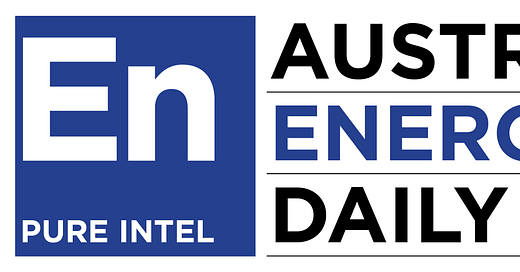Day 50: 'A cracker of a project'
An introductory weekday newsletter from Schwartz Media. Counting the days since Australia had an energy policy.

Good morning and welcome to day 50.
Today in summary: State and territory energy ministers will meet in Sydney on October 26, in their first meeting with the Commonwealth since the NEG was dumped; Western Australia’s government paid troubled wave energy company Carnegie Clean Energy A$2.6m, with conditions; and Prime Minister Scott Morrison threw his support behind Tasmania’s ‘Battery of the Nation’ project and its ‘“fair dinkum” power.
— Charis
Today’s policy spin level: 💨💨💨
Please don’t keep Australian Energy Daily to yourself. Forward this email to your colleagues and encourage them to sign up for free here.
Federal energy minister Angus Taylor has reportedly summoned state and territory energy ministers to a meeting in Sydney on October 26. The reliability obligation is expected to be at the top of the agenda, along with electricity price reduction measures recommended by the ACCC that require state cooperation to deliver. The meeting comes as Victoria prepares to go into caretaker mode ahead of the state election, and after strong words from ACCC Chair Rod Sims who last week said the government should push on with energy policy without waiting for agreement on emissions reductions.
The GuardianWave energy company Carnegie Clean Energy has been given a nine-week deadline to deliver a detailed funding plan to the West Australian government, after the state paid the embattled company a A$2.6 million milestone payment. The government said the company had met its contractual obligations, and blamed federal government changes to R&D tax incentives for its financial woes.
“The Federal Government's proposal to change R&D tax incentives, contained in their 2018-19 Budget, has threatened the bottom line of several Western Australian companies - from renewable energy to tech metals.
“These changes emerged after the State Government signed the funding agreement for the Albany wave energy technology development project.”
Carnegie recently posted a A$64 million annual loss, despite receiving A$25 million in R&D tax refunds between 2013-14 and 2017-18.
Visiting Tasmania for the Liberal State Council on the weekend, Prime Minister Scott Morrison threw his weight behind Tasmania’s ‘Battery of the Nation’ project and the state’s ability to deliver “fair dinkum” power.
“I think it’s a cracker of a project and we’ve invested, already, in working up business cases and feasibilities around a lot of these projects for pumped hydro and we’re going to have a look at one of those very soon.”
Coming up
The long-awaited Intergovernmental Panel on Climate Change special report on limiting global warming to 1.5°C will be released today at 12 noon AEST (or 1pm AEDT). Leaked drafts suggest human-induced warming is expected to exceed 1.5°C by around 2040, with “rapid and far-reaching” transitions in the world economy and deep reductions in all emission sectors required to keep it under that cap. Here’s a handy guide to what else to expect in the report.
Vox | Axios | Sydney Morning Herald
The Commentariat
“A traded carbon price would bring emissions at low cost,” writes Ross Garnaut in a piece analysing how Australia’s energy landscape has changed in the ten years since he presented his Garnaut Climate Change Review.
“It is worth continuing discussion of a traded carbon price, and supporting genuinely expert modelling and analysis of the effects on electricity prices,” he says, noting that “Carbon pricing requires policy stability for good results”.
“We are not a company or an industry afraid of scrutiny or reform,” writes head of Origin Energy Frank Calabria in the Australian Financial Review. Imploring federal policymakers to treat the root cause of the energy crisis and focus less on the symptoms, Calabria says the energy sector agrees with the government on the need to reduce power prices, as well as the need for simplifying energy offers to aid customers in comparing retailers. But he’s cautious on default pricing, as recommended by the competition regulator:
“A default price that is genuinely a reference point and that is set at the appropriate level to enable competitive offers from a wide range of retailers can work in the consumers' favour. However, fixed price regulation would result in unintended consequences and is effectively focusing on the symptom, not the cause.”
Three more things
“The grid hasn't kept pace with the explosion of homeowners wanting to export surplus energy back into the grid, setting up a two-way flow the centralised networks weren't designed for and reducing power quality,” write the Australian Financial Review’s Ben Potter and Angela MacDonald-Smith. The solution nobody wants to see is curtailment - a forced reduction in the flow of solar power into the grid. Energy Networks Australia Chief Andrew Dillon said curtailment was a last resort, and that the issue was rather “how we line up investment in strengthening the grid with the new investment in generation that's happening”.
Shale gas developer Cuadrilla Resources is set to commence gas fracking in England’s north west next week, “seven years after its first attempt to hydraulically fracture a well led to earth tremors, public protests and an overhaul of regulations”.
Australian start-up Brighte has devised “an interactive online loan system and virtual marketplace that connects solar installers with households wanting to upgrade their homes, allowing them to buy now and pay later”. The system is intended to address a growing gap between rich and poor identified by AEMO CEO Audrey Zibelman, which has seen consumers who “cannot afford solar panels effectively paying for those who can through higher power prices”.
This is an introductory service while we’re building a comprehensive daily paid online publication, coming in early 2019.
We’re not here to take sides, simply to cut through the noise, and help you make sense of the emerging policy and market trends you need to be across. We call it pure intel. You can read more about us here.


